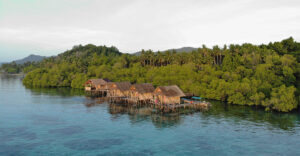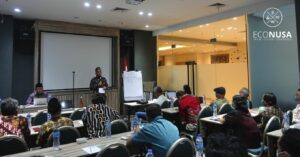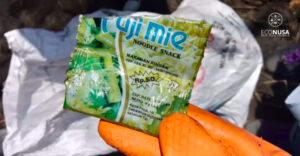
The EcoNusa Foundation initiated a School of Eco Diplomacy (SED) Basic Class in Jayapura, Papua, on November 13-15, 2019. The SED was carried out in collaboration with the Provincial Government of Papua through the Forestry Service, Cendrawasih University, Papua Natural Resources Conservation Center (BBKSDA), Jayapura Community Forum, Jayapura Mangrove House, and EcoNusa Foundation.
SED participants were divided into five groups in making the action plan. They outlined action plans for forest loss in Cycloops Mountains, wise use of plastic, overcoming mangrove degradation, restoring the beauty of coral reefs, to saving sea turtles.
One of the groups highlighted the degradation of mangrove ecosystems occurred in Youtefa Bay Nature Tourism Park (TWA) in which the mangrove forest cover has been drastically reduced. In 1967, the mangrove forest in TWA Youtefa Bay was 511.24 ha. While in 2008, the area was reduced by more than half up to 241.24 ha. Declining area of mangrove forests also occurred during the construction of Youtefa Bridge.
“The preservation of the mangrove ecosystem is very beneficial for the community. Not only storing carbon, the preservation of mangrove forests is also useful for people in Enggros Village as it can be used for ecotourism, ” said Lumeli Jacky Buly, SED participant.
In addition to the shrink area of forest cover, various plastic wastes pollute the mangrove ecosystem. Disposable plastic is buried between mangrove roots. The Women Forest, which may only be entered by the mothers located around Youtefa Bay, is polluted by plastics. This condition is detrimental to the people of Enggros Village where the mothers look for shells (bia). Plastic waste has piled up there which needs many people to clean the areas.
“In the past they did not feel itchy because the water was still clean, not polluted. But now Mama should scratch her body after looking for shells, maybe because the water has been polluted by rubbish,” said Lian Youwe, a resident of Enggros Village who told SED participants during a field visit.
Editor: Leo Wahyudi S.




